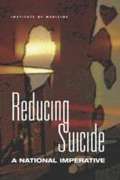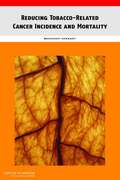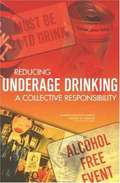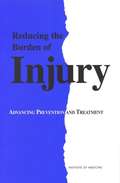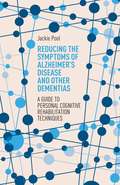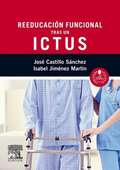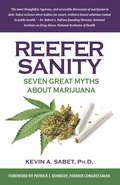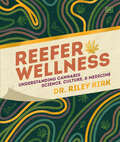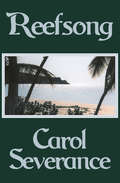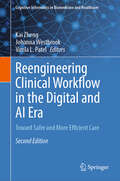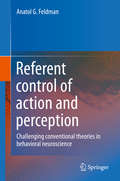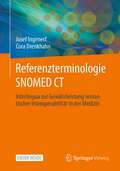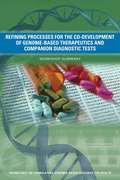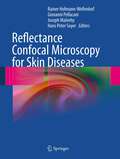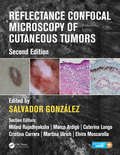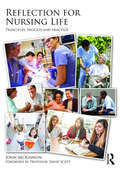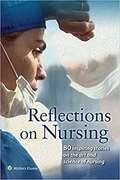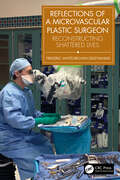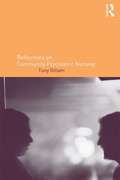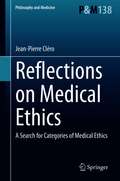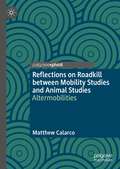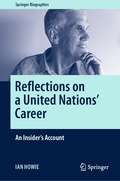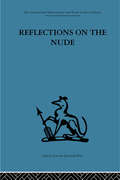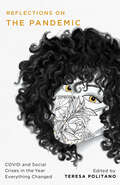- Table View
- List View
Reducing Suicide: A National Imperative
by Committee on Pathophysiology Prevention Of Adolescent Adult SuicideEvery year, about 30,000 people die by suicide in the U.S., and some 650,000 receive emergency treatment after a suicide attempt. Often, those most at risk are the least able to access professional help.Reducing Suicide provides a blueprint for addressing this tragic and costly problem: how we can build an appropriate infrastructure, conduct needed research, and improve our ability to recognize suicide risk and effectively intervene. Rich in data, the book also strikes an intensely personal chord, featuring compelling quotes about people’s experience with suicide. The book explores the factors that raise a person’s risk of suicide: psychological and biological factors including substance abuse, the link between childhood trauma and later suicide, and the impact of family life, economic status, religion, and other social and cultural conditions. The authors review the effectiveness of existing interventions, including mental health practitioners’ ability to assess suicide risk among patients. They present lessons learned from the Air Force suicide prevention program and other prevention initiatives. And they identify barriers to effective research and treatment.This new volume will be of special interest to policy makers, administrators, researchers, practitioners, and journalists working in the field of mental health.
Reducing Tobacco-Related Cancer Incidence and Mortality
by Institute of Medicine Board on Health Care Services Sharyl J. Nass Margie Patlak Erin Balogh National Cancer Policy ForumTobacco use is the leading cause of preventable death in United States, causing more than 440,000 deaths annually and resulting in $193 billion in health-related economic losses each year--$96 billion in direct medical costs and $97 billion in lost productivity. Since the first U.S. Surgeon General's report on smoking in 1964, more than 29 Surgeon General's reports, drawing on data from thousands of studies, have documented the overwhelming and conclusive biologic, epidemiologic, behavioral, and pharmacologic evidence that tobacco use is deadly. This evidence base links tobacco use to the development of multiple types of cancer and other life-threatening conditions, including cardiovascular and respiratory diseases. Smoking accounts for at least 30 percent of all cancer deaths, and 80 percent of lung cancer deaths. Despite the widespread agreement on the dangers of tobacco use and considerable success in reducing tobacco use prevalence from over 40 percent at the time of the 1964 Surgeon General's report to less than 20 percent today, recent progress in reducing tobacco use has slowed. An estimated 18.9 percent of U.S. adults smoke cigarettes, nearly one in four high school seniors smoke, and 13 percent of high school males use smokeless tobacco products. In recognition that progress in combating cancer will not be fully achieved without addressing the tobacco problem, the National Cancer Policy Forum of the Institute of Medicine (IOM) convened a public workshop, Reducing Tobacco-Related Cancer Incidence and Mortality, June 11-12, 2012 in Washington, DC. In opening remarks to the workshop participants, planning committee chair Roy Herbst, professor of medicine and of pharmacology and chief of medical oncology at Yale Cancer Center and Smilow Cancer Hospital, described the goals of the workshop, which were to examine the current obstacles to tobacco control and to discuss potential policy, outreach, and treatment strategies that could overcome these obstacles and reduce tobacco-related cancer incidence and mortality. Experts explored a number of topics, including: the changing demographics of tobacco users and the changing patterns of tobacco product use; the influence of tobacco use on cancer incidence and cancer treatment outcomes; tobacco dependence and cessation programs; federal and state level laws and regulations to curtail tobacco use; tobacco control education, messaging, and advocacy; financial and legal challenges to tobacco control efforts; and research and infrastructure needs to support tobacco control strategies, reduce tobacco related cancer incidence, and improve cancer patient outcomes. Reducing Tobacco-Related Cancer Incidence and Mortality summarizes the workshop.
Reducing Underage Drinking: A Collective Responsibility
by National Research Council Institute of Medicine of the National AcademiesAlcohol use by young people is extremely dangerous - both to themselves and society at large. Underage alcohol use is associated with traffic fatalities, violence, unsafe sex, suicide, educational failure, and other problem behaviors that diminish the prospects of future success, as well as health risks – and the earlier teens start drinking, the greater the danger. Despite these serious concerns, the media continues to make drinking look attractive to youth, and it remains possible and even easy for teenagers to get access to alcohol. Why is this dangerous behavior so pervasive? What can be done to prevent it? What will work and who is responsible for making sure it happens? Reducing Underage Drinking addresses these questions and proposes a new way to combat underage alcohol use. It explores the ways in which may different individuals and groups contribute to the problem and how they can be enlisted to prevent it. Reducing Underage Drinking will serve as both a game plan and a call to arms for anyone with an investment in youth health and safety.
Reducing the Burden of Injury: Advancing Prevention and Treatment
by Institute of MedicineInjuries are the leading cause of death and disability among people under age 35 in the United States. Despite great strides in injury prevention over the decades, injuries result in 150,000 deaths, 2.6 million hospitalizations, and 36 million visits to the emergency room each year.Reducing the Burden of Injury describes the cost and magnitude of the injury problem in America and looks critically at the current response by the public and private sectors, including: Data and surveillance needs.Research priorities.Trauma care systems development.Infrastructure support, including training for injury professionals.Firearm safety.Coordination among federal agencies. The authors define the field of injury and establish boundaries for the field regarding intentional injuries. This book highlights the crosscutting nature of the injury field, identifies opportunities to leverage resources and expertise of the numerous parties involved, and discusses issues regarding leadership at the federal level.
Reducing the Symptoms of Alzheimer’s Disease and Other Dementias: A Guide to Personal Cognitive Rehabilitation Techniques
by Jackie PoolThis innovative new book sets out practical guidance for people with dementia, their families and carers on reducing the symptoms of Alzheimer's disease and other dementias. Applying a 'rementia' based approach to dementia care, Jackie Pool shows how therapeutic cognitive rehabilitation techniques can be used to reduce symptoms of dementia and ultimately improve quality of life for people living with dementia.Covering topics such as nutrition, stress, communication, memory and sleep, it provides all the tools and information necessary to build a personalised and flexible self-care plan which will improve and sustain quality of life. By clearing away the myths and stigma surrounding dementia, this book creates room for cooperation, creativity and hope.
Reeducación funcional tras un ictus + acceso web (Spanish Edition)
by Isabel Jiménez Martín José Castillo SánchezObra que presenta una revisión práctica de las terapias de reeducación funcional empleadas en la rehabilitación de pacientes que han sufrido patologías cerebrovasculares. <P><P>Además de la rehabilitación motora y la logopedia, existen una serie de terapias alternativas que completan la recuperación funcional del paciente que ha sufrido un ictus. El objetivo de este libro es ofrecer una visión de estas terapias, mostrando las últimas técnicas dentro de la recuperación tradicional, describiendo otras nuevas terapias de apoyo que han arrojado buenos resultados, así como incidiendo en las líneas de futuro en las que se está investigando. <P><P>El contenido se distribuirá a lo largo de un total de 20 capítulos en los cuales se abordarán aspectos generales tales como cuestiones demográficas y epidemiológicas de las patologías cerebrovasculares, hasta temas más específicos centrados fundamentalmente en las distintas terapias de apoyo disponibles para la rehabilitación de estos pacientes. <P><P>Se incluye también una serie de vídeos que abordan cuestiones tales como la movilización del paciente y el aseo, ejercicios de movilización y prevención de escaras, entre otras cuestiones. <P><P>Obra única que ofrece un abanico de oportunidades de rehabilitación y en el que participan profesionales de distintas áreas y con distintas formaciones pero con un objetivo común: proporcionar información útil y con rigor científico a los afectados y a los profesionales sobre qué hacer para mejorar la recuperación de un paciente tras un ictus. <P><P>Innovadora obra en sus planteamientos que presenta una revisión práctica de las terapias de reeducación funcional empleadas en la rehabilitación de pacientes que han sufrido patologías cerebrovasculares. <P><P>20 capítulos para un abordaje completo que tratan los aspectos generales como cuestiones demográficas y epidemiológicas de las patología cerebrovasculares hasta temas más específicos centrados fundamentalmente en las distintas terapias de apoyo disponibles para la rehabilitación de estos pacientes, y se adentra de forma complementaria en temas como la familia del paciente con ictus, la adaptación de la vivienda o los recursos sociales para pacientes dependientes tras un ictus. <P><P>Ofrece un abanico de oportunidades de rehabilitación con la visión de profesionales de distintas áreas y con distintas formaciones pero con un objetivo común: proporcionar información útil y con rigor científico a los afectados y a los profesionales sobre qué hacer para mejorar la recuperación de un paciente tras un ictus.
Reefer Sanity: Seven Great Myths About Marijuana
by Kevin SabetIn this book, Kevin A. Sabet argues that the United States should not legalize pot with all of its attendant social costs, nor damage the future prospects of pot smokers by prosecuting and jailing them.
Reefer Wellness: Understanding Cannabis Science, Culture, and Medicine
by Dr. Riley KirkAre you canna-curious? Put aside the stigma and discover the powerful potential of weed.For centuries, the marijuana plant has been revered for its healing properties, but it&’s also been criminalized, abused, and misunderstood. Although cannabis is now legal in much of the United States, many people are still confused about how to access it and unsure about how to use it safely and effectively. Enter Reefer Wellness, an all-encompassing guide to cannabis from scientist and researcher, Dr. Riley Kirk.With colorful illustrations and everyday language, Reefer Wellness challenges the stereotypes about pot use and breaks down the complexities of cannabis for anyone who&’s ever wondered if weed could help them relax or relieve chronic ailments. Whether you&’re an everyday user or just starting out on your healing journey with cannabis, you&’ll find answers to your questions and science-backed evidence to support your use. In it, you&’ll get:An introduction to the endocannabinoid system (ECS), the powerful regulatory system in the human body that controls everything from hunger signals to painA clear, visual explanation of how the molecular components of cannabis interact with the ECS, making it a uniquely powerful tool for healingGuidance on how to consume cannabis, including the pros and cons of different delivery systems and how to customize your dosageAn overview of ailments that can be addressed with cannabis, such as chronic pain, sleep disorders, and insomniaTips for minimizing the side effects of marijuana use, like munchies, bloodshot eyes, and cottonmouthLet Reefer Wellness jumpstart your deep and meaningful journey into the wonderful and nuanced world of modern cannabis and get ready to unlock its incredible healing potential.
Reefsong
by Carol SeveranceAfter narrowly escaping death in a forest fire, Angie Dinsman found herself under the control of the World Life Company. They promptly equipped her with webbed hands and gills—creating a half‑fish, half‑woman. Her mission is to uncover secret research files on the water world of Lesaat. But first she has to undergo the terrifying process of learning to breathe underwater. After mastering the basics of survival, she faces an insurmountable challenge: finding the information that could end starvation on Earth while sabotaging the company's evil plans.
Reengineering Clinical Workflow in the Digital and AI Era: Toward Safer and More Efficient Care (Cognitive Informatics in Biomedicine and Healthcare)
by Vimla L. Patel Kai Zheng Johanna WestbrookThis timely new edition addresses gaps in the understanding of how health information technology (IT) impacts clinical workflows and how this impact is central to the safe and effective delivery of care to patients. The research in this area has advanced substantially in the past few years since the publication of the first edition, marked by milestone events such as the widespread and matured use of health IT, particularly electronic health records, and a new wave of innovations stimulated by the clinical application of AI-enabled systems such as ambient documentation technologies. This book has been expanded to reflect these new developments in the field and features clearly structured chapters covering a wide range of topics, including aspects of clinical workflows relevant to both practitioners and patients, tools for recording clinical workflow data, and techniques for potentially redesigning health IT-enabled care coordination. Reengineering Clinical Workflow in the Digital and AI Era: Toward Safer and More Efficient Care enables readers to develop a deeper understanding of clinical workflows and how they can potentially be modified to facilitate greater efficiency and safety in care provision, offering a valuable resource for both biomedical and health informatics professionals and trainees.
Referent control of action and perception
by Anatol G. FeldmanEmpirical data on neural control of motor action and perception have not yet been put into the context of a coherent theory. Dr. Feldman's goal for the proposed book is to illustrate that the field is now at a stage where the data can be used to formulate some core principles that underlie action and perception and to present the foundation of a scientific theory of motor control. Dr. Feldman is a well-known expert and has been active in the field for a long time. In the proposed book he will outline an approach to the analysis of action and perception that he and his colleagues have been using for the past 50 years or so. His theoretical approach will not only help to explain past empirical research, but should also help to inform and provide a structure for future empirical studies.
Referenzterminologie SNOMED CT: Interlingua zur Gewährleistung semantischer Interoperabilität in der Medizin
by Josef Ingenerf Cora DrenkhahnSNOMED CT wird zunehmend auch in Deutschland als wesentlicher Baustein innovativer digitaler Gesundheitsanwendungen verwendet. Sie gilt mit über 350.000 formal definierten Konzepten sowie mehrsprachigen Bezeichnungen als ausdrucksmächtigste internationale Referenzterminologie. Gleichwohl stellt die Einführung von SNOMED CT mit dem Potenzial zur Postkoordination „neuer Konzepte“ einen Paradigmenwechsel dar. Dieser geht einher mit vielfältigsten methodischen Grundlagen, die interessierten Anwendern und Software-Entwicklern vermittelt werden müssen, um den erwarteten Nutzen realisieren zu können. Dieses Buch soll hierzu einen Beitrag leisten.
Refining Processes for the Co-Development of Genome-Based Therapeutics and Companion Diagnostic Tests
by Sarah H. BeachyMany drug developers have examined new strategies for creating efficiencies in their development processes, including the adoption of genomics-based approaches. Genomic data can identify new drug targets for both common and rare diseases, can predict which patients are likely to respond to a specific treatment, and has the potential to significantly reduce the cost of clinical trials by reducing the number of patients that must be enrolled in order to demonstrate safety and efficacy. A key component of the approval of targeted therapeutics is the ability to identify the population of patients who will benefit from treatment, and this has largely hinged on the co-development and co-submission to the FDA of a companion diagnostic test. The co-development process, or the development of the test and drug for the simultaneous submission to FDA, has led to a major alteration in the way that drugs are being developed, with traditionally separate entities--pharmaceutical and diagnostic companies--now working in close collaboration. Refining Processes for the Co-Development of Genome-Based Therapeutics and Companion Diagnostic Tests is the summary of a workshop held by the Roundtable on Translating Genomic-Based Research for Health on February 27, 2013 to examine and discuss challenges and potential solutions for the codevelopment of targeted therapeutics and companion molecular tests for the prediction of drug response. Prior to the workshop, key stakeholders, including laboratory and medical professional societies, were individually asked to provide possible solutions to resolve the concerns raised about co-development of companion diagnostic tests and therapies. Workshop speakers were charged with addressing these solutions in their presentations by providing insight on (1) whether the proposed solutions address the problems described, (2) whether there are other solutions to propose, and (3) what steps could be taken to effectively implement the proposed solutions.
Reflectance Confocal Microscopy for Skin Diseases
by Hans Peter Soyer Giovanni Pellacani Joseph Malvehy Rainer Hofmann-WellenhofThis book focuses on the use and significance of in vivo reflectance confocal microscopy (RCM) for non-invasive high-resolution imaging of the skin. All of the chapters in this hands-on guide are generously illustrated with numerous confocal images and structured in a reader-friendly way. The contents include detailed information on the most relevant and up-to-date aspects of RCM, schematic drawings summarizing and explaining the most important RCM criteria, and a chapter specifically devoted to bridging the gap between dermoscopy, RCM, and histopathology. At the end of each chapter, core messages recapitulate the most pertinent aspects. Reflectance Confocal Microscopy for Skin Diseases will be a valuable resource for all physicians involved in the diagnosis and treatment of neoplastic and inflammatory skin diseases.
Reflectance Confocal Microscopy of Cutaneous Tumors
by Salvador GonzálezReflectance confocal microscopy enables lesions in skin to be examined without excision, but with improved diagnostic accuracy, assessment of dermoscopic-histologic correlation, assessment of surgical margins, as well as speed and convenience for the physician and patient. This extensively enlarged and updated text reviews the current and future state of the art for those involved with the diagnosis and treatment of skin tumors, with a greatly increased amount of material on the expected normal patterns of skin throughout life and on non-melanocytic tumors.
Reflectie en intervisie door verpleegkundigen: Praktijkboek voor de reflectieve professional
by Nicolien van HalemDit boek helpt verpleegkundigen zich te ontwikkelen tot onderzoekende en reflectieve professionals met zelfkennis, compassie en morele gevoeligheid. Dat doet het met een waaier aan werkvormen en modellen voor reflectie en intervisie. Het is bedoeld om direct mee aan de slag te gaan, individueel of in een groep. Het boek is geschikt voor ervaren verpleegkundigen én verpleegkundigen in opleiding.Reflectie en intervisie door verpleegkundigen: Praktijkboek voor de reflectieve professional geeft een theoretisch kader voor reflectie en intervisie. Het boek behandelt communicatietheorieën die helpen om het eigen gedrag én dat van collega’s beter te begrijpen. De speelse, direct toepasbare werkvormen maken reflectie en intervisie leuk en uitdagend. Ook andere collegiale overlegvormen komen aan bod. Elk hoofdstuk bevat digitale oefenopdrachten en praktische werkbladen.Met dit boek kunnen verpleegkundigen tijdens en na hun opleiding zelfstandig of onder begeleiding reflecteren op stage of werk. Ook kunnen ze samen met collega’s intervisie uitvoeren. Zo komt actief werken met dit boek de kwaliteit van het beroep ten goede.
Reflection for Nursing Life: Principles, Process and Practice
by John McKinnonOver the past decades, reflection has taken centre stage in nursing education but it is easy to get stuck in a superficial cycle of storytelling and self-examination, without getting any further insights into your own practice and abilities. Reflection for Nursing Life starts with a basic introduction to reflective practice and moves through to look at more critical perspectives, with guidance for reflecting on the complex realities of practice. This accessible text is designed to support a deeper understanding of the value of reflection and its relationship with the needs of modern practice. Beginning with discussions of self-awareness and the reflective cycle, it goes on to explore ideas about critical incidents, critical reflection models and transformational learning. It integrates cutting-edge neuro-scientific research and thinking about emotional labour and intelligence in healthcare into mainstream reflective practice, drawing on both new and established ways of guiding learning and professional judgment. Reflection for Nursing Life includes numerous exemplar reflective narratives, diagrams and exercises to help the reader identify their strengths and weaknesses, whilst tips for overcoming weaknesses and developing strengths are also provided. It is the ideal text for nursing students and practitioners looking to improve their reflective practice skills.
Reflections On Nursing
by American Journal of Nursing Company StaffOffering life- and career-changing moments in nurses’ lives, the 80 true stories in Reflections on Nursing reveal nursing at its most demanding and fulfilling. Written mainly by nurses offering care at home, hospital, or hospice, these first-person stories convey the professional burdens, personal growth, and inner realizations found in the course of patient care. Whether you are a new or experienced practitioner, or just fascinated by nursing care in action, these inspiring true stories show nursing as both professional and life experience, and often, as an inspired journey. Experience the challenges and hard-earned wisdom of these real-life nursing moments: · Written by or about nurses of all experience levels and in numerous care settings , including stories about memorable nurses written by patients, family members, and doctors · Dive into these engrossing short stories, and go on a journey with: the nurse who inspires dignity and strength in a young soldier who is losing his wife the young nurse who stands up to a bullying preceptor the nurse who realizes her best friend, a fellow nurse, is stealing drugs from their unit the nurse struggling to give adequate care to seven patients at once on an understaffed unit the retired doctor who recalls the nurse who saved him, as a young intern, from mishandling a crucial situation with a dying patient the nurse who takes on an angry patient with a challenging case, to offer special help and encouragement nurses who become a patient The nurse/administrator who pushes hard for administrative decisions that will support nurses and improve patient care the inspiring patients who help nurses remember why they became a nurse
Reflections of a Microvascular Plastic Surgeon: Reconstructing Shattered Lives
by Frederic White-Brown DeleyiannisThis book discusses the scope and limitations of complex reconstructive surgery that few plastic surgeons master, and that the public rarely encounters, portraying both the technical challenges of advanced reconstructive microsurgery and the human connection between physician and patient as only a master surgeon can convey.For decades, Dr. Deleyiannis has practiced one of the most demanding fields of surgery, treating patients with highly complex and devastating deformities from cancer, trauma, and birth anomalies. Laying the historical foundation of scientific discoveries upon which modern microsurgical practice is based, he takes us “behind the scenes” with real patients’ stories, highlighting surgical innovation in his own career and the impact on the lives of those he treats.Plastic surgeons and surgeons specializing in reconstruction techniques for patients who have suffered either trauma or cancer will find inspiration and renewed dedication for their specialty within the pages of this book.
Reflections on Community Psychiatric Nursing
by Tony GillamReflections on Community Psychiatric Nursing provides new insights into many aspects of the CPN's work. Written by a practising CPN , this is a lively and easy-to-read introduction to the key debates in community mental health, covering issues including: * professional identity* the community and the role of the nurse* teaching, assessment and clinical supervision* good practice and the concept of risk* mental health promotion* user involvement* treatment, from medication to psychosocial interventions.This text is essential reading for students and those undertaking further training as CPN's. In addition, practising nurses and other professionals will find it useful in developing their own reflective practice as well as offering a useful overview of an increasingly important area of nursing.
Reflections on Medical Ethics: A Search for Categories of Medical Ethics (Philosophy and Medicine #138)
by Jean-Pierre CléroThis book questions the notions of person, personality, dignity, and other connected notions such as (informed) consent, and discusses new perspectives on categories that allow ethical debates in medicine to overcome morals and ordinary religious schemes. The book states that one has to be careful when thinking about situations in terms of notions and principles that have been obtained in similar situations. Though this book is mostly philosophical, it is also of great practical interest to healthcare givers. It warns caregivers not to rely too much on notions such as person, autonomy, and consent, which are supposedly firm but can be proven to be unreliable in spite of appearances. Furthermore, this work warns against a narrow anthropologisation of ethics which would make technophobian positions unavoidable. On the contrary, this book is open to robotics and offers – among other things - a sustained exploration of the notion of intimacy.
Reflections on Roadkill between Mobility Studies and Animal Studies: Altermobilities
by Matthew CalarcoRoadkill is a recurrent but often unthought feature of modern life. Yet, consideration of the broader significance of the myriad social, ethical, and political issues related to roadkill has largely gone missing from mainstream scholarship and activism. This neglect persists even in fields such as mobility studies and animal studies that would otherwise seem to have a vested interest in the topic. This book aims to bring roadkill to the foreground of current discussions among scholars and activists in these fields in order to demonstrate that roadkill is a uniquely important site from which to understand and contest the machinations of the dominant social order. It argues that a careful examination of roadkill can help both to uncover the hidden violence of contemporary human-centered systems of mobility and to develop alternative modes of mobility for a renewed social life in common with our more-than-human kin.
Reflections on a United Nations' Career: An Insider's Account (Springer Biographies)
by Ian HowieThis book is more than an autobiographical account of the career of a young graduate from Australia who spent his life working as a United Nations official. It is in fact, a critical, indispensable debriefing of a UN insider’s account as it follows the life of a development practitioner for more than three decades within the global aid sector.It also goes where few others have dared to go before, providing first-hand insights into the realities of a UN career official’s life. While many throughout the world may wish to join the “UN family” or have already become part of the development sector, it is presumed they all have a vision to act as vehicles for positive social change. However, expectations can and may differ once realities have sunk in. The book opens a unique space in the international aid sector – particularly, population security – around elements of personal and professional rewards and costs.
Reflections on the Nude (International Behavioural And Social Sciences Ser. #Vol. 100)
by Adrian StokesTavistock Press was established as a co-operative venture between the Tavistock Institute and Routledge & Kegan Paul (RKP) in the 1950s to produce a series of major contributions across the social sciences. This volume is part of a 2001 reissue of a selection of those important works which have since gone out of print, or are difficult to locate. Published by Routledge, 112 volumes in total are being brought together under the name The International Behavioural and Social Sciences Library: Classics from the Tavistock Press. Reproduced here in facsimile, this volume was originally published in 1967 and is available individually. The collection is also available in a number of themed mini-sets of between 5 and 13 volumes, or as a complete collection.
Reflections on the Pandemic: COVID and Social Crises in the Year Everything Changed
by Joyce Carol Oates Marc Aronson James Goodman Mark Doty Susan Miller David Orr David Greenberg Rigoberto González Angelique Haugerud Jonathan Scott Holloway Naomi Jackson Gregory Pardlo Caridad Svich Ulla D. Berg Vikki S. Katz Patricia Akhimie Belinda McKeon Louis Masur Amy Jordan Stephanie Bonne Paul Falkowski Mary E. O'Dowd James W. Hughes Yalidy Matos Kimberly Camp Kelly-Jane Cotter David Dreyfus Adrienne Eaton Katherine Epstein Mackenzie Kean Amir Lighty Revathi Machan Stephen Masaryk Yehoshua November Katherine Ognyanova Steve Pikiell Benjamin Pukert Leslieann Hobayan Leah Falk Teresa PolitanoReflections on the Pandemic: COVID and Social Crises in the Year Everything Changed is a collection of essays, poems, and artwork that captures the raw energy and emotion of 2020 from the perspective of the Rutgers University community. The project features work from a diverse group of Rutgers scholars, students, staff, and alumni. Reflecting on 2020 from a number of perspectives – mortality, justice, freedom, equality, democracy, family, health, love, hate, economics, history, medicine, science, social justice, the environment, art, food, sanity – the book features contributions by Evie Shockley, Joyce Carol Oates, Naomi Jackson, Ulla Berg, Grace Lynne Haynes, Jordan Casteel, and President Jonathan Holloway, among others. This book, through its rich and imaginative storytelling at the intersection of scholarly expertise and personal narrative, brings readers into the hearts and minds of not just the Rutgers community but the world. Contributors include: Patricia Akhimie, Marc Aronson, Ulla D. Berg, Stephanie Bonne, Stephanie Boyer, Kimberly Camp, Jordan Casteel, Kelly-Jane Cotter, Mark Doty, David Dreyfus, Adrienne E. Eaton, Katherine C. Epstein, Leah Falk, Paul G. Falkowski, Rigoberto González, James Goodman, David Greenberg, Angelique Haugerud, Grace Lynne Haynes, Leslieann Hobayan, Jonathan Holloway, James W. Hughes, Naomi Jackson, Amy Jordan, Vikki Katz, Mackenzie Kean, Robert E. Kopp, Christian Lighty, Stephen Masaryk, Louis P. Masur, Revathi V. Machan, Yalidy Matos, Belinda McKeon, Susan L. Miller, Yehoshua November, Joyce Carol Oates, Mary E. O’Dowd, Katherine Ognyanova, David Orr, Gregory Pardlo, Steve Pikiell, Teresa Politano, en Purkert, Nick Romanenko, Evie Shockley, Caridad Svich, and Didier William.
